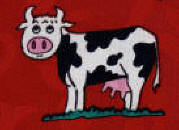Doc A's Web Page

~~~~~~~~~~~~~~~~~
|
Doc A's Web Page
~~~~~~~~~~~~~~~~~ |

"Sacred cows make the best hamburger."
(original quote frequently attributed to Mark Twain)
* * * * *
|
|
|
Never Underestimate People's Ability to Amaze You!
(interesting news stories)
I have recently retired from teaching (May 2012) and am now able to spend more time doing research, working around the farm, riding my motorcycle, and being with my lovely wife, Amy. I have left the various syllabi for the courses I taught on my website, however, in case they prove useful to anyone, especially as I created numerous web pages for each course and established links to several other web pages containing information relevant to the topics covered in those courses.
* * * * *
|
"A concern with knowing the world, rather than advocating a view of the world because it confirms some political, ideological, or religious project, has always been fundamental to scientific philosophy."
--Lawrence Kuznar, Reclaiming a Scientific Anthropology (1997)
|
COURSES TAUGHT:
|
Origin and Evolution of Religious Movements
|
Anthropology, Religion and the Bible Anthropology, Religion and the Rise of Christianity Research Design in Anthropology Anthropology of Sex and Gender
|
Jesus Christ Superstar
The Last Supper
|
|
|
|
* * * * *
(over Beer with Adam and Tyler)
(2003)
Selected Web Pages:
A Critical Review of the Species Concept
Although species are widely viewed as genetic units defined by the ability of individual organisms to exchange hereditary material (DNA), this view of species does not accurately reflect the species concept as it is understood and applied in contemporary biological and ecological research. This paper critically examines the species concept and suggests that, given the arbitrariness of the definition of species and the inability to apply any species concept consistently and universally, species should be recognized not as a natural entity, but rather as a human construct with only limited validity and utility.
|
Circumcision, Subincision and Other Forms of Ritual Genital Surgery
While many in the West voice opposition to what is ethnocentrically referred to as "Female Genital Mutilation," the fact is that female circumcision throughout the world is performed under conditions identical to male circumcision, and for the same reasons. Moreover, while male circumcision is performed in numerous societies that do not perform female circumcision, female circumcision is only performed in those societies that also perform male circumcision. |
Although infanticide is strongly opposed in the West, it is a common family planning technique in many parts of the world, where it is practiced for the same reasons that abortions are performed in developed countries. Many of the same questions can be raised about both practices.
|
|
Ever since the damage caused by Hurricane Katrina, many have claimed that an increase has occurred in both the number and the destructiveness of hurricanes due to global warming. The data does not support such claims.
|
While the loudest voices in the environmental movement have been among the middle and upper-middle classes, it is the lifestyle of this segment of the population that causes the most environmental damage. |
|
Is There A Bias In Higher Education? While conservative religious colleges are more often accused of presenting ideologically biased courses and educational programs, many non-religious colleges and universities are equally guilty.
|
You Are a Fluke of the Universe
For centuries, humans have believed that they are the most important species. However, the reality is that humans represent a rather late and insignificant development in the evolution of the earth and the universe that might never have happened. |
|
Despite the hysteria claiming that current levels of logging will cause a catastrophic destruction of the world's forests, a critical examination of two articles presenting just such a claim --one on Brazil and one on the Congo-- shows that the authors' own data don't support their arguments.
|
Beginning with Paul Ehrlich's, The Population Bomb, hysteria about overpopulation has been at the center of the environmental movement. Among other things, overpopulation has been presented as the major cause of poverty and environmental degradation throughout the world. The data, however, shows little support for such arguments. |
|
Sociopolitical Implications of the Western Concern
Neo-Malthusian population theories
predominate in the international arena because they perform the same
sociopolitical function for the globally dominant societies today that
earlier Malthusian theories performed for upper classes within Western
societies: a rationalization and justification for controlling the
reproduction of the poor.
|
Ecological Theory and the Evolution
An ecological model of community development based on the relationship between productivity, stability and diversity in ecological systems offers a systematic and testable model of social evolution that can effectively account for the variable evolution of complex human communities in different ethnographic contexts. The utility of the model is illustrated through its application to nineteenth century Mormon settlements in the Little Colorado River Basin of Arizona. |
|
Hill's Criteria of Causation outline the minimal conditions needed to establish a causal relationship between two items.
|
Chief Seattle's speech has been revered by many people for the inspirational message it provides and for the respect for the environment it displays. However, the entire speech is a fabrication. The words attributed to Chief Seattle were never spoken by him; nor could they have been.
|
|
in North America and Palestine
American colonization westward throughout the 19th century shows a remarkable similarity to contemporary Israeli colonization of Palestine, regarding the actions of both the colonizer and the colonized.
|
Feminists have attempted to characterize Taliban rule in Afghanistan as a "War on Women." Taliban rule should more appropriately be viewed as that of an Islamic fundamentalist polity whose ultra-conservative policies are directed at men and women alike, as well as at those non-Muslim populations who do not adhere to their creed.
|
|
As a social science, anthropology is concerned with the application of scientific methods to explaining human social behavior. This page discusses some of the issues related to the application of scientific methods in anthropological research.
|
Aristotelian vs. Galilean Forms of Explanation: Implications for Explaining Human Behavior
The difference between Aristotelian and Galilean explanations is that the former provides an explanation based on an indefinable "essence" within an object, which determines that objects behavior, while the latter provides a conditional explanation based on the interaction of measurable variables that together determine the outcome of an event. The use of such Aristotelian concepts as culture, patriarchy, maternal instinct, human nature, etc. in the explanation of human behavior needs to be replaced with systemic explanations based on the interaction of measurable variables within a predictive and testable theoretical framework. |
|
Just How Democratic Are American Elections?
Americans are taught how important it is to vote and how much every vote counts. However, largely due to gerrymandering and disproportionate campaign spending, most elections in the U.S. are determined long before voting take place, with incumbents all-but-guaranteed reelection.
|
Hero and Inspiration to the Nazis
Martin Luther was a
notorious anti-Semite who served as a spiritual inspiration to the Nazis.
Several Nazi leaders praised him, and shortly after coming to power they
built an imposing church in his honor.
|
|
While Jesus is generally referred to as the "Prince of Peace," concerned with the welfare of all mankind, he may have been more violent and more specifically Jewish in orientation than is generally believed.
|
Genealogy, Politics and History
Parts of the genealogy contained in the Hebrew Bible may represent a political rationalization for Israelite relations with neighboring peoples, associating their rivals' ancestors with sexual misconduct. |
|
While the various stories surrounding the birth of Jesus provide a beautiful backdrop to the Christmas season, none of them is true. Not only are they contradictory, they are also unsupported by the historical evidence. When considered as a group, the Infancy Narratives tell us more about the evolution of Christian beliefs about Jesus than they do about his actual birth.
|
The New Testament does not specify when Jesus was born, and the currently accepted year is unlikely to be correct. Only two gospels --Matthew and Luke-- mention Jesus' birth. Being driven primarily by theological considerations rather than by a concern with historical accuracy, the infancy narratives contained in these two gospels not only contradict one another in almost every detail; they also run counter to logic and are completely unsupported by the historical evidence.
|
Although December 25th is the date on which most Western Christians celebrate Jesus' birth, no one knows either the day or the year in which Jesus was born. The December 25th date was established during the 4th century, nearly 400 years after Jesus died, and continues to be rejected by some 200-300 million Eastern Orthodox Christians who celebrate that event on January 6th. Establishing the date of Jesus' birth was a work in progress for nearly four centuries, during which various dates were proposed. It appears most likely that the December 25th date resulted from the borrowing of a then-popular pagan mid-winter celebration.
Expanding out of Palestine and into the wider Roman world, Christian missionaries as early as Paul himself encountered a wide array of pagan beliefs and practices. However, as the Church became centered in Rome and strove to establish itself as the official religion of the Roman Empire, it had to compete with those forms of paganism that predominated at the heart of the empire and that enjoyed official support. While several gods and their associated beliefs and rituals enjoyed official recognition, worship of the sun god in the form of
Sol Invictus was superseded during the third century CE by devotion to Mithras, When Christianity spread throughout the empire and became increasingly dominant in Rome itself, Mithraism formed the foundation of Roman paganism. It was, thus, with this religion that the emerging Roman Church had to most directly compete and against which it directed much of its anti-pagan hostility, while at the same time incorporating many of its beliefs and rituals, including the celebration of Jesus' virgin birth on December 25th.
Each year on Good Friday, Christians around the world remember the trial and crucifixion of Jesus. However, the story as it is told in the four gospels --which present conflicting versions of that event-- is not how it likely happened. The earliest account of the trial is told by Mark and later modified by the other evangelists to fit their own theologies and to accommodate evolving beliefs about Jesus. As a result, while the core of the narrative remains relatively constant throughout the four gospels, the details of the story vary significantly. To understand what most likely happened, Jesus' crucifixion needs to be understood in its historical, rather than mythical, context.
Christ in the Mystic Winepress
Christ in the Mystic Winepress was a popular Christian motif during the late Middle Ages and early Renaissance. It was based on eschatological interpretations of passages in Isaiah and the Book of Revelation, as well as on Catholic belief in the redemptive power of Christ's blood. The winepress motif was one of the few Catholic teachings that survived the Protestant Reformation. However, while Catholic theologians emphasized the winepress as representing Christ's Passion and suffering, Protestant theologians placed greater emphasis on the winepress as expressing Christ's triumph over evil. While the Christ in the Winepress image has largely disappeared from Christian art and theology, the concept of the winepress has continued to serve as a powerful literary metaphor.
Christian Origins of the Holocaust
The mass slaughter of Jews by the Nazis represented the culmination of nearly 2,000 years of violent Christian anti-Semitism.
Ashoura is the holiest day of the Muslim calendar. For Shia Muslims, it marks the martyrdom of Imam Hussein, the grandson of the Prophet Mohammed, in a 7th century battle for leadership of the Islamic world. Pilgrims flagellate themselves with chains and cut themselves with swords in grief at Hussein's death. Flagellation rituals have been performed by specific Christian groups as well.
* * * * *
Short Commentaries:
|
|
|
|
Putting Israeli Bombing of Gaza in Perspective
|
|
|
|
|
|
Anti-Immigration Hysteria in the U.S.
|
|
From Nuremberg to Charlottesville
Scopes, Evolution and Dayton, Tennessee
* * * * *
PUBLICATIONS:
Books
1. DAM THAT RIVER! Ecology and Mormon Settlement in the Little Colorado River Basin. University Press of America. Lanham, MD. 1993.
Articles
1. Population Pressure and Subsistence Strategies among the Mbuti Pygmies. Human Ecology 7:183-189. (1979)
2. Ecological Theory and Ethnic Differentiation among Human Populations. Current Anthropology 23:13-31. (1982)
3. Reply to F. Morin and H. Nevadomsky, 'On Ecological Theory and Ethnic Differentiation.' Current Anthropology 23:347. (1982)
4. Water and Community Development in the Little Colorado River Basin, Human Ecology 12(2):241-269. (1985)
5. Ecological Stability and Community Diversity during Mormon Colonization of the Little Colorado River Basin. Human Ecology 15:317-338. (1987)
6. Ecology, Resource Redistribution and Mormon Settlement in Northeastern Arizona. American Anthropologist 91:642-655. (1989)
7. The Social and Ecological Consequences of Early Cattle Ranching in Northeastern Arizona. Human Ecology 23:75-98 (1995)
8. Ecological Theory and the Evolution of Complex Human Communities. Advances in Human Ecology 5:111-156. (1996)
9. Chief Seattle's Speech: A Critical Consideration. FORUM: of the Association for Arid Lands Studies 13: 52-60. (1997)
10. The Real Chief Seattle was Not a Spiritual Ecologist. The Skeptical Inquirer March/April : 44-48. (1999)
11. The Myth of Chief Seattle. Human Ecology Review 7:72-75. (2000)
12. Sociopolitical Implications of the Persistent Western Concern with Global Population Growth. FORUM: of the Association for Arid Lands Studies. (2002)
13. Competitive Exclusion and Protohistoric Population Interactions in New Mexico. FORUM: of the Association for Arid Lands Studies 19. (2003)
14. The Intersection of Genealogy, Politics and History in Genesis. FORUM: of the Association for Arid Lands Studies 20:83-95. (2004)
15. Ecology and Ethnic Interactions in New Mexico, 1700 - 1850. FORUM: of the Association for Arid Lands Studies 22:1-14. (2006)
Chapters in Books
1. Flux Among the Mbuti Pygmies of the Ituri Forest: An Ecological Interpretation. In Eric B. Ross, ed., Beyond the Myths of Culture: Explorations in Cultural Materialism. New York: Academic Press, pp. 331. (1980)
2. The Impact of Environmental Productivity and Stability on Community Diversity during Mormon Colonization of the Little Colorado River Basin. In R. Borden, J. Jacobs, G. Young and J. Weisbaden, eds., Human Ecology: Research and Applications. College Park: Society for Human Ecology, pp. 105114. (1987)
3. The Effect of Local Environmental Variation on the Development of Early Mormon Settlements in Northeastern Arizona. in E. Schultz, ed. Forum, vol. 8. Lubbock, TX: International Center for Arid and Semiarid Land Studies, pp. 65-75. (1992)
4. Ecological Concepts in Anthropological Human Ecology: Illustrations from Mormon Settlement in Northeastern Arizona. in Scott Wright, Thomas Deitz, Richard Borden, Gerald Young and Gregory Guagnano, eds., Human Ecology: Crossing Boundaries. Society for Human Ecology: College Park, MD, pp. 255-271. (1993)
5. Ecology and Mormon Settlement in Northeastern Arizona. In D. Bates and S. Lees (eds.), Case Studies in Human Ecology, pp. 365-391. New York: Plenum Press. (1996)
6. Materialist versus Non-Materialist Explanations of Mbuti Pygmy Subsistence Behavior. In Serge Bahuchet, Daniel Bley, Bernard Brun, Nicole Licht & Helene Pagezy (eds.), L'Homme et la Foret Tropicale. Marseilles: University of Provence Press, pp. 301-309. (1999)
* * * * *
"Out of Egypt have I called my son."
(Matthew 2:15)
|
|
Angus enjoying
a "poochie cone"
* * * * *
|
|
(2005)
|
|
|
|
New Mexico, Colorado, Utah & Arizona (2009)
|
|
|
Monticello Creek Motorcycle Ride (2009)
|
|
|
|
|
* * * * *
|
|
|
(2018)
|
* * * * *
|
|
Some Closing Thoughts . . .
"The person who finds his homeland sweet is a tender beginner; he to whom every soil is as his native one is already strong; but he is perfect to whom the entire world is as a foreign place. The tender soul has fixed his love on one spot in the world; the strong person has extended his love to all places; the perfect man has extinguished his."
--Hugh of St. Victor (c. 1096-1141)
* * * * *
One way to protect yourself from ideas you don't like.

* * * * *
|
"Give not that which is holy unto the dogs, neither cast ye your pearls before swine."
--Matthew 7:6
|
"The world always blames the thunder-bolt, it forgets the storm that had been gathering through the years."
--Clarence Darrow (1920)
* * * * *
|
|
Wanda:
Henry:
|
Don't you hate people?
I don't hate people; I just feel better when they're not around. --Barfly
|
|
* * * * *